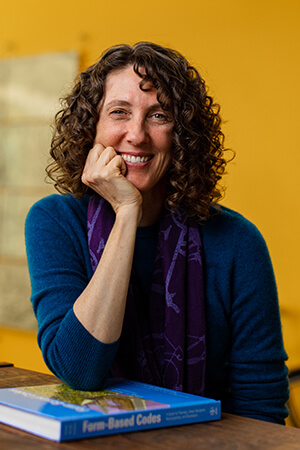
A passionate advocate for healthy, walkable, rollable and equitable communities, user-centered design thinking and impact-driven business.
Karen’s efforts redesigning zoning codes for cities in the U.S. and abroad have helped revolutionize the way we regulate land development in our communities to reinforce more walkable, rollable and sustainable places and have led to her recognition as a national expert in Form-Based Coding and zoning reform. She is co-author of the book “Form-Based Codes: A Guide for Planners, Urban Designers, Municipalities, and Developers” (Wiley, 2008).
Karen spearheaded Opticos’s initiative to create MissingMiddleHousing.com and is regularly invited to speak with organizations around the country about this effective housing affordability solution (especially in light of the housing crisis facing many U.S. cities) and critical element of walkable and rollable communities. Committed to developing better ways of running a business, Karen led Opticos to become a founding B Corporation in 2007 and a California Benefit Corporation in 2012—new types of impact-driven companies committed to a triple bottom line of social, environmental and fiscal responsibility.
Karen's Thoughts:
-
Why Form and Scale Matter in the Missing Middle Housing Conversation
-
How to Get By-Right Zoning Right
-
The “Missing Middle” Affordable Housing Solution
-
Akanda SmartCode: Coding for Sustainability in Developing Countries
-
Reasons to Invest in Missing Middle Housing: A Call to Action for Cities and Developers
-
Pedestrians First
-
Why I Bike
-
Bicycles in Rome
-
Why We Became a B: Making a Commitment to a Triple Bottom Line